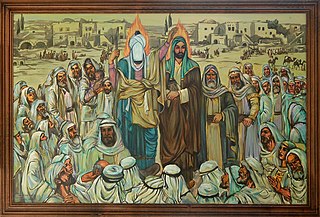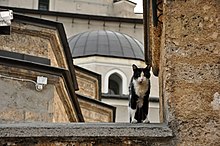A fatwa is a legal ruling on a point of Islamic law (sharia) given by a qualified Islamic jurist (faqih) in response to a question posed by a private individual, judge or government. A jurist issuing fatwas is called a mufti, and the act of issuing fatwas is called ifta'. Fatwas have played an important role throughout Islamic history, taking on new forms in the modern era.

Muḥarram is the first month of the Islamic calendar, and one of the four sacred months of the year when warfare is banned. The tenth of Muharram is known as Ashura, an important day of commemoration in Islam. For Sunni Muslims, the day marks the parting of the Red Sea by Moses and the salvation of the Israelites, celebrated through supererogatory fasting and other acceptable expressions of joy. By contrast, Ashura is a day of mourning for Shia Muslims, who annually commemorate the death of Husayn ibn Ali, grandson of the Islamic prophet Muhammad and the third Shia imam. Husayn was killed, alongside most of his relatives and his small retinue, in the Battle of Karbala in 680 CE against the army of the Umayyad caliph Yazid ibn Mu'awiya. The Shia rituals span the first ten days of Muharram, culminating on Ashura with mourning processions in Shia cities. Also in Muharram, the Aqsa mosque in Jerusalem was initially set as the direction of prayer for early Muslims.

Ashura is a day of commemoration in Islam. It occurs annually on the tenth of Muharram, the first month of the Islamic calendar. For Sunni Muslims, Ashura marks the parting of the Red Sea by Moses and the salvation of the Israelites. Also on this day, Noah disembarked from the Ark, God forgave Adam, and Joseph was released from prison, among various other auspicious events on Ashura in Sunni tradition. Ashura is celebrated in Sunni Islam through supererogatory fasting and other acceptable expressions of joy. In some Sunni communities, the annual Ashura festivities include carnivals, bonfires, and special dishes, even though some Sunni scholars have criticized such practices.

The Buraq is a supernatural horse-like creature in Islamic tradition that served as the mount of the Islamic prophet Muhammad during his Isra and Mi'raj journey from Mecca to Jerusalem and up through the heavens and back by night. The Buraq is also said to have transported certain prophets such as Abraham over long distances within a moment's duration.

A mufti is an Islamic jurist qualified to issue a nonbinding opinion (fatwa) on a point of Islamic law (sharia). The act of issuing fatwas is called iftāʾ. Muftis and their fatwas played an important role throughout Islamic history, taking on new roles in the modern era.
Ma'ruf is an Islamic term meaning that which is "well-known, universally accepted, ... that which is good, beneficial ...; fairness, equity, equitableness;". It is used 38 times in the Quran. The word is most often found in the Qur'anic exhortation: امر بالمعروف و نهى عن المنكر "Amr bil Ma'ruf wa Nahy an al Munkar", often translated as "Enjoin the good and forbid the wrong".
Abū Saʿīd ʿAbd-al-Ḥayy ibn Żaḥḥāk b. Maḥmūd Gardīzī, better known as Gardizi (گردیزی), was an 11th-century Persian historian and official, who is notable for having written the Zayn al-akhbar, one of the earliest history books written in New Persian.

In Islam, angels are believed to be heavenly beings, created from a luminous origin by God. The Quran is the principal source for the Islamic concept of angels, but more extensive features of angels appear in hadith literature, Mi'raj literature, Islamic exegesis, theology, philosophy, and mysticism.
The ten to whom Paradise was promised were ten early Muslims to whom, according to Sunni Islamic tradition, the Islamic prophet Muhammad had promised Paradise.

The Ghadīr Khumm was a gathering of Muslims to attend a sermon delivered by the Islamic prophet Muhammad on 16 March 632 CE. The gathering is said to have taken place by the ghadir (pool) in the wadi of Khumm, located near the then settlement of al-Juhfa on the path between Mecca and Medina, where Muhammad halted the large caravan of Muslims who had accompanied him in the Farewell Pilgrimage, his only Hajj ritual.

Manouba is a city in north-eastern Tunisia, and is part the metropolitan area of Tunis, also called "Grand Tunis". It is located at the west of Tunis city center at around 36°48′28″N10°6′4″E. It is the capital city of Manouba Governorate.
According to Islam, animals are conscious of God. According to the Quran, they praise Him, even if this praise is not expressed in human language. Baiting animals for entertainment or gambling is prohibited. It is forbidden to kill any animal except for food or to prevent it from harming people.
Abū al-Walīd ‘Abd Allāh ibn Muḥammad ibn Yūsuf ibn Naṣr ibn al-Faraḍī al-Azdī al-Qurṭubī , best known as Ibn al-Faraḍī, was an Andalusian historian, chiefly known for his Tarikh ulama al-Andalus, a biographical dictionary about religious scholars from al-Andalus. He was a faqīh (jurist) and a muhaddith.

A shaitan or shaytan is an evil spirit in Islam, inciting humans and jinn to sin by whispering in their hearts. Although invisible to humans, shayatin are imagined to be ugly and grotesque creatures created from Hellfire.

In Islam, the belief that spiritual entities—particularly, jinn—can possess a person,, is widespread; as is the belief that the jinn and devils can be expelled from the possessed person through exorcism. This practice is called al-'azm or ruqya, and exorcists are called raqi.
Laylat al-mabit refers to the night in 622 CE in which the Islamic prophet Muhammad fled Mecca for Yathrib, apparently to foil an assassination plan. His escape from Mecca followed the exodus of his persecuted followers to the safe haven of Yathrib, a city that was later renamed Medina in his honor. Laylat al-mabit is often associated in Islamic literature with the reports that Muhammad's cousin Ali ibn Abi Talib risked his life to facilitate Muhammad's safe escape from Mecca.
Zayn al-Dīn Abū Jaʿfar Muḥammad ibn ʿAlī ibn Shahrāshūb ibn Abī Naṣr ibn Abī al-Jaysh, more commonly known simply as Ibn Shahrāshūb, died 1192, was a literate Shia commentator, traditionist and jurist. He was an early eminent scholar amongst the shia community in the investigation of hadith and also Quranic sciences.
Majd ad-Dīn Ibn al-Athīr ash-Shaybānī (1149–1210) was an historian, biographer and lexicographer. His full name was Abū l-Saʿādāt al-Mubārak b. Muḥammad (al-Athīr) b. Muḥammad b. ʿAbd al-Karīm b. ʿAbd al-Wāḥid al-Shaybānī al-Jazarī al-Mawṣilī. Majd ad-Dīn was one of three brothers from a wealthy family of scholars, all known as Ibn al-Athīr of Jazirat Ibn ‘Umar and Mosul. The other two being Ali ibn al-Athir and Diyā' ad-Dīn, who was also an historian. The father Muḥammad b. ‘Abd al-Karim was an official of the Zangid government. Majd al-Dīn was in the service of the emir of Mosul, Ghāzi b. Mawdūd, and later Mas‘ūd b. Mawdūd and Arslan Shāh. Although he became paralysed he continued working and outlived his two brothers. He was a distinguished translator of the Arabic language. The Ibn al-Athīr family were Arab, or Kurdish, of the Shayban lineage of the large and influential Arab tribe Banu Bakr, who lived across upper Mesopotamia, and gave their name to the city of Diyar Bakr.
Khabbāb ibn al-Aratt, c. 585 – c. 660, was a Companion of the Islamic prophet Muhammad whom Islamic tradition regards as one of the ten earliest converts to Islam. Born as a slave in Mecca, he later became a swordsmith and was able to build up enough of a reputation to eventually get freed by his master. His beautiful recitation of the Quran is said to have been the direct cause of Umar ibn al-Khattab's conversion to Islam in c. 616.
Gabriel Said Reynolds is an American academic and historian of religion, who serves as Jerome J. Crowley and Rosaleen G. Crowley Professor of Theology and assistant professor of Islamic Studies and Theology at the University of Notre Dame. His scholarship focuses on World Religions and World Church, History of Christianity, Qur'anic Studies, Origins of Islam, and Muslim-Christian relations.









